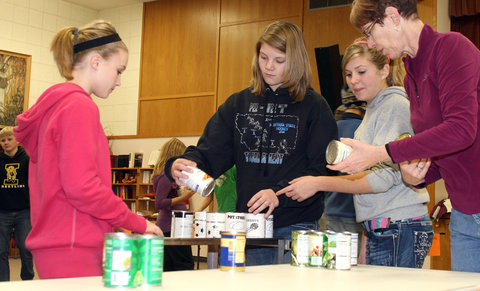 Nikki Carlson/Havre Daily News, via Associated PressChurch youth group members sort canned items for a food drive in Montana.
Nikki Carlson/Havre Daily News, via Associated PressChurch youth group members sort canned items for a food drive in Montana.
Over on Slate yesterday, the new Moneybox columnist Matthew Yglesias sounded off on food drives. Having to pick up or sort your donations of random cans is highly inefficient. Much of the stuff that people remove from their pantries is unusable because it’s old or it’s junk food, he said. Plus, most food banks, he noted, can buy highly discounted bulk food in a variety of ways.
It’s better, he concluded, to simply hand over the money you would have spent on the food at retail prices and let the food banks buy what they need on the cheap.
There is part of me that loves the pure rationality here. But here’s what you miss when you make this all about the money: the opportunity to teach. For a child, for instance, a food drive offers all sorts of lessons.
The conversation might start here: Sometimes, we buy more than we need. Isn’t that silly? What can we do here in our house to figure out the difference between things we need and things we want? The discussion possibilities are endless; every room offers fodder, not just the kitchen.
But let’s say we do have more than we need. If that happens, we can give it to someone who has less than they need. The visceral experience of sorting through physical items (including toys and clothes and books) and figuring out what isn’t truly necessary is something that you can’t easily replace by writing a check to the needy.
Then, you pack up the items and deliver them to a central collection point. The volume of items is itself illuminating: Oh look, others are trying to help, too. We’re all in this together. Can we do it again sometime? Or, alternatively, why is it that no one is helping? Can we help get the word out?
I’m not sure whether the real and pressing need to teach children to be charitable outweighs any hassle or waste that is created by the cans themselves. But I’m pretty sure that the children who participate in food drives stand a good chance of growing up to be adults who write the sort of checks that Mr. Yglesias calls for. Or of turning into the sort of children who might bring a few dollars from their allowance, too, the next time there is a canned food drive in their community.
What do you think?
Article source: http://feeds.nytimes.com/click.phdo?i=3a4d8dfd74a0d7f9b08a4b2480355df2